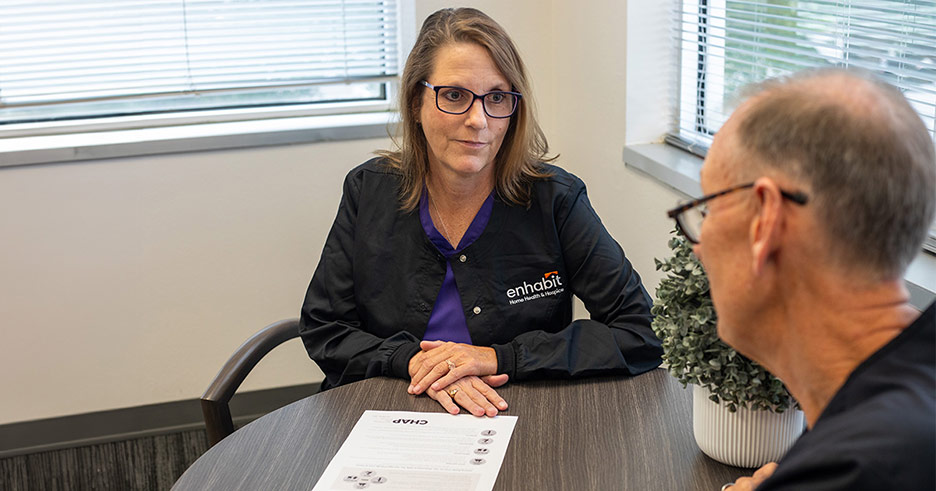Julie Jolley just assumed she’d spend her career inside of a hospital when she entered nursing. However, after one weekend working in home health, she knew this was the setting she was meant to work in. And she switched her career from a hospital to home health nurse.
Julie’s introduction to home health was by chance. A friend approached her about picking up a couple weekends a month for a local agency in Amarillo, Texas.
“I’d never done home health,” she recalled. “I remember coming back to the hospital after that first weekend and thinking, I can’t believe people get paid to do this. I loved it. You’re not rushed and are able to truly focus on one patient.”
Julie Jolley said working as a nurse in a hospital environment helped her to be successful in home health
Julie is still loving it two decades later, even though the field and her role have changed dramatically since she began working in home health.
She entered the field as a nurse; today, she is the executive vice president of home health operations for Enhabit Home Health & Hospice.
Her path to get there would take her through many roles, the first of which was a nurse at a general medicine hospital.
Julie continued at the hospital after that first weekend working in home health. But she would pick up a few weekends a month in home health. When the agency offered her the opportunity to join full-time, she eagerly accepted.
Five years later, Enhabit purchased it. “That’s how I came to be a part of this family,” Julie said.
Hospital to home health nurse to leadership roles
Over the years, she was promoted several times. She served as branch director, then administrator before named a regional director and then regional president. She was responsible for 11 branches in west Texas and New Mexico.
Now, she serves as Enhabit’s executive vice president of home health operations.
Her leadership roles took her away from patient visits–something that concerned her at first. Up until she became an executive, she would still make an occasional patient admission.
“If everyone was busy, and I was in town, I would do an admission, so I could see patients,” she said. “I travel more now, so I’m not able to do that as much, but it helps that I’m still using my clinical skills.”
Julie knows that even though she’s not seeing them in the home any longer, her daily work is still centered on patients. “I never lose sight of that,” she added.
Moving to the administrative side was a learning experience for Julie. Luckily, it was simple due to the help of her many mentors in the company. She also has an “awesome” husband.
“He’s very supportive,” Julie said. “He’s a great partner and does all he can to help me be successful.”
Encouraging future nurses
Julie also does her part to help young nurses be successful. Even though she prefers home health to the hospital setting, she encourages all new nurses to start out in a general medicine hospital. She recommends choosing one where they can learn from the experience of those around them.
“I always recommend that,” she said. “In home health you’re kind of out there on your own. You have to have confidence, and you can really get that in a hospital, where you’ve got experienced nurses seeing what you’re seeing.”
Social Share
At Enhabit our patients are our number one priority. From providing the latest medical practices to building deep personal connections, we’re focused on upholding every patient’s dignity, humanity and sense of control on their health care journey.
Home health
Our home health services give patients access to the care they deserve in the comfort of their own homes. From disease and injury management to recovery from surgery, our clinicians help patients confidently achieve their healthcare goals.
Hospice care
Our hospice care services place importance on the comfort of every patient living with a terminal illness. Our caring professionals are dedicated to providing not just physical care, but spiritual and emotional support to every patient and their loved ones.

 Back to Resource library
Back to Resource library




